Living at home is important to your quality of life. But mobility challenges and fatigue can make household chores difficult.
Get started with a plan
- Make a list of chores that need doing, when they need to be done and how often.
- Set priorities. Which chores are the most important?
- Identify the chores you are able to do yourself and where you need some help.
- Talk to your healthcare team about what support is available in your community. Do an internet search of agencies in your area that can help.
- Share your list with your family and friends who have offered to help. Accept their help.
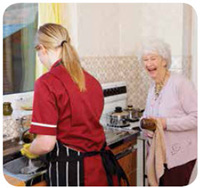
Shopping tips
- Write a list of the items you need to buy before you go to the store. Take the list and a pen with you. Cross off the items as you find them.
- If getting out is not possible, shop online or call in a telephone order to your grocery store.
- Try to do small shops more often. Getting too many items at once can be tiring. It means pushing a heavy shopping cart and carrying a lot of bags.
- Allow yourself plenty of time to do the shopping — do not rush.
- Ask a family member or friend if they can go to the grocery store with you.
- Ask for help if you cannot reach an item.
- Use credit or debit cards to pay, so that you don’t have to count out cash.
Doing laundry
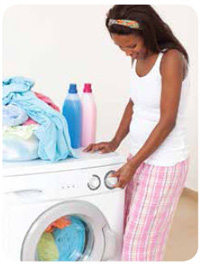
- Make sure you can get to the laundry area easily.
- Keep small, light laundry hampers in the bathroom and bedroom. Line them with shopping bags. This will make it a little easier to get the clothes out of the hamper and to the washer.
- Have a chair next to the washer so you can sit when loading.
- Clearly mark the settings on the washer and dryer. You can use coloured stickers or labels.
- Push buttons or large dials on laundry machines are easier to use than small knobs. You can add a tap turner to get better leverage with small knobs.
- Make sure detergents and laundry supplies are within easy reach — at waist level.
- Clearly label your laundry detergents and supplies. Keep them sealed securely.
- Pour liquid laundry detergent into smaller, easy-to-use containers, such as pump-action or squeeze bottles.
- Fold washing while sitting. Use a table or low counter to avoid having to bend over.
- An iron that shuts off automatically helps prevent burns to clothing and skin.
- Avoid clothing that requires special care.
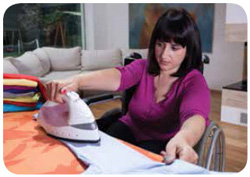
Keeping the house clean
- Look for cleaning products that are simple to use, such as disposable wipes and multi-purpose cleaners.
- Use light cleaning tools and small containers. Avoid lifting large, heavy objects like buckets of water.
- Use long-handled brushes, mops and dusters to clean hard-to-reach areas.
- Put cleaning liquids in easy-to-use containers such as pump-action, spray or squeeze bottles.
- Keep cleaning materials within easy reach.
- Sit whenever you can while cleaning.
- Clean only one small area at a time. Take frequent breaks.
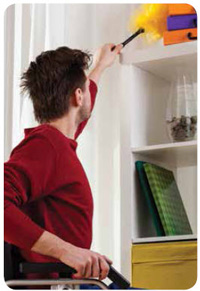
Yard work and gardening
- Use hand tools with cushioned, thick or built-up handles that are easy to hold.
- Use long-handled tools to get to spots that are difficult to reach.
- Protect your hands with gardening gloves. Wear an apron with pockets, where you can store small gardening tools.
- Keep a phone with you in case you need help while you are outside.
- Be aware of tripping hazards such as steps, objects lying on the ground or uneven ground. Keep equipment such as garden hoses organized and out of the way so that you do not trip over them.
- Raised garden beds, vertical gardens and high pots are easier to reach than garden beds at ground level.
- When working on the ground, use a sturdy garden seat with kneeler cushioning. You can lean on the seat when you stand up.
- Keep a drink of water in a plastic bottle nearby.
- Sit down when you can. For instance, you could sit at a table or bench to pot or prune plants.
- Keep tools that you use often within easy reach.
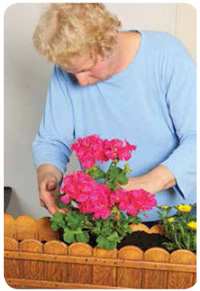
Beat stroke.
Join the fight to end heart disease and stroke.
Where to get support
Your occupational therapist can help you to adapt tasks to your abilities.
Support services in the community can help with household chores. Some charge fees. Others rely on volunteers or are part of a government-funded home care program. These services are usually aware of each other and can refer you to a service if they don’t provide it themselves.
Call on your family members and friends who have offered help.
